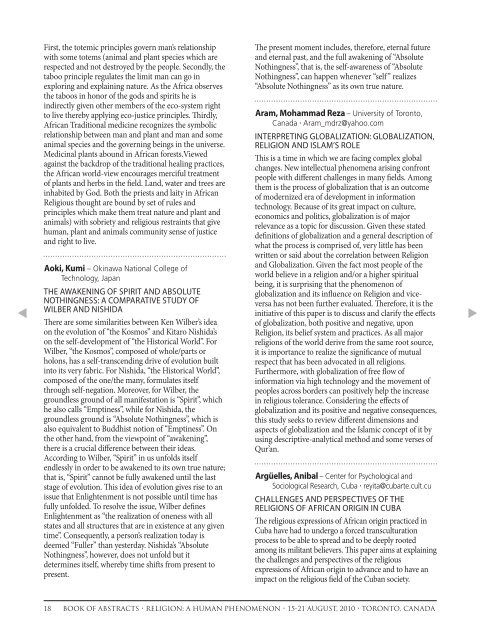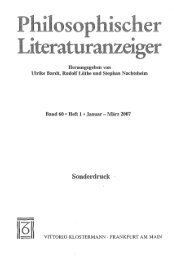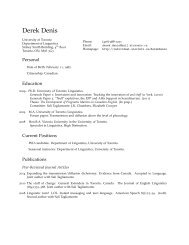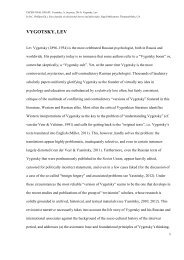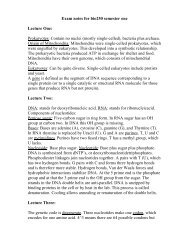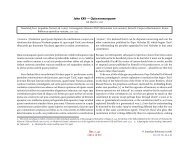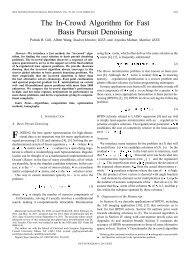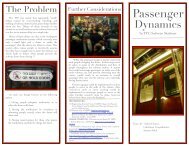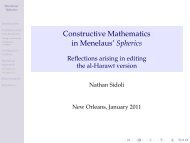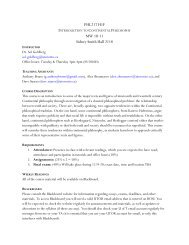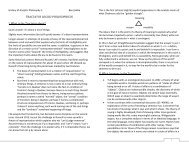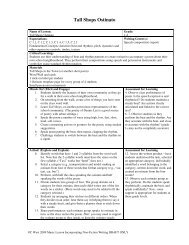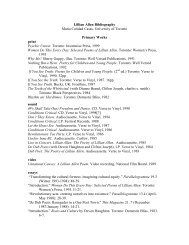BOOK of ABSTRACTS XXTh WORld COngReSS InTeRnATIOnAl ...
BOOK of ABSTRACTS XXTh WORld COngReSS InTeRnATIOnAl ...
BOOK of ABSTRACTS XXTh WORld COngReSS InTeRnATIOnAl ...
Create successful ePaper yourself
Turn your PDF publications into a flip-book with our unique Google optimized e-Paper software.
First, the totemic principles govern man’s relationship<br />
with some totems (animal and plant species which are<br />
respected and not destroyed by the people. Secondly, the<br />
taboo principle regulates the limit man can go in<br />
exploring and explaining nature. As the Africa observes<br />
the taboos in honor <strong>of</strong> the gods and spirits he is<br />
indirectly given other members <strong>of</strong> the eco-system right<br />
to live thereby applying eco-justice principles. Thirdly,<br />
African Traditional medicine recognizes the symbolic<br />
relationship between man and plant and man and some<br />
animal species and the governing beings in the universe.<br />
Medicinal plants abound in African forests.Viewed<br />
against the backdrop <strong>of</strong> the traditional healing practices,<br />
the African world-view encourages merciful treatment<br />
<strong>of</strong> plants and herbs in the field. Land, water and trees are<br />
inhabited by God. Both the priests and laity in African<br />
Religious thought are bound by set <strong>of</strong> rules and<br />
principles which make them treat nature and plant and<br />
animals) with sobriety and religious restraints that give<br />
human, plant and animals community sense <strong>of</strong> justice<br />
and right to live.<br />
Aoki, Kumi – Okinawa National College <strong>of</strong><br />
Technology, Japan<br />
tHe aWakening <strong>of</strong> sPirit and aBsolute<br />
notHingness: a comParative study <strong>of</strong><br />
WilBer and nisHida<br />
There are some similarities between Ken Wilber’s idea<br />
on the evolution <strong>of</strong> “the Kosmos” and Kitaro Nishida’s<br />
on the self-development <strong>of</strong> “the Historical World”. For<br />
Wilber, “the Kosmos”, composed <strong>of</strong> whole/parts or<br />
holons, has a self-transcending drive <strong>of</strong> evolution built<br />
into its very fabric. For Nishida, “the Historical World”,<br />
composed <strong>of</strong> the one/the many, formulates itself<br />
through self-negation. Moreover, for Wilber, the<br />
groundless ground <strong>of</strong> all manifestation is “Spirit”, which<br />
he also calls “Emptiness”, while for Nishida, the<br />
groundless ground is “Absolute Nothingness”, which is<br />
also equivalent to Buddhist notion <strong>of</strong> “Emptiness”. On<br />
the other hand, from the viewpoint <strong>of</strong> “awakening”,<br />
there is a crucial difference between their ideas.<br />
According to Wilber, “Spirit” in us unfolds itself<br />
endlessly in order to be awakened to its own true nature;<br />
that is, “Spirit” cannot be fully awakened until the last<br />
stage <strong>of</strong> evolution. This idea <strong>of</strong> evolution gives rise to an<br />
issue that Enlightenment is not possible until time has<br />
fully unfolded. To resolve the issue, Wilber defines<br />
Enlightenment as “the realization <strong>of</strong> oneness with all<br />
states and all structures that are in existence at any given<br />
time”. Consequently, a person’s realization today is<br />
deemed “Fuller” than yesterday. Nishida’s “Absolute<br />
Nothingness”, however, does not unfold but it<br />
determines itself, whereby time shifts from present to<br />
present.<br />
The present moment includes, therefore, eternal future<br />
and eternal past, and the full awakening <strong>of</strong> “Absolute<br />
Nothingness”, that is, the self-awareness <strong>of</strong> “Absolute<br />
Nothingness”, can happen whenever “self” realizes<br />
“Absolute Nothingness” as its own true nature.<br />
Aram, Mohammad Reza – University <strong>of</strong> Toronto,<br />
Canada • Aram_mdrz@yahoo.com<br />
interPreting gloBalization: gloBalization,<br />
religion and islam’s role<br />
This is a time in which we are facing complex global<br />
changes. New intellectual phenomena arising confront<br />
people with different challenges in many fields. Among<br />
them is the process <strong>of</strong> globalization that is an outcome<br />
<strong>of</strong> modernized era <strong>of</strong> development in information<br />
technology. Because <strong>of</strong> its great impact on culture,<br />
economics and politics, globalization is <strong>of</strong> major<br />
relevance as a topic for discussion. Given these stated<br />
definitions <strong>of</strong> globalization and a general description <strong>of</strong><br />
what the process is comprised <strong>of</strong>, very little has been<br />
written or said about the correlation between Religion<br />
and Globalization. Given the fact most people <strong>of</strong> the<br />
world believe in a religion and/or a higher spiritual<br />
being, it is surprising that the phenomenon <strong>of</strong><br />
globalization and its influence on Religion and viceversa<br />
has not been further evaluated. Therefore, it is the<br />
initiative <strong>of</strong> this paper is to discuss and clarify the effects<br />
<strong>of</strong> globalization, both positive and negative, upon<br />
Religion, its belief system and practices. As all major<br />
religions <strong>of</strong> the world derive from the same root source,<br />
it is importance to realize the significance <strong>of</strong> mutual<br />
respect that has been advocated in all religions.<br />
Furthermore, with globalization <strong>of</strong> free flow <strong>of</strong><br />
information via high technology and the movement <strong>of</strong><br />
peoples across borders can positively help the increase<br />
in religious tolerance. Considering the effects <strong>of</strong><br />
globalization and its positive and negative consequences,<br />
this study seeks to review different dimensions and<br />
aspects <strong>of</strong> globalization and the Islamic concept <strong>of</strong> it by<br />
using descriptive-analytical method and some verses <strong>of</strong><br />
Qur’an.<br />
Argüelles, Anibal – Center for Psychological and<br />
Sociological Research, Cuba • reyita@cubarte.cult.cu<br />
cHallenges and PersPectives <strong>of</strong> tHe<br />
religions <strong>of</strong> african origin in cuBa<br />
The religious expressions <strong>of</strong> African origin practiced in<br />
Cuba have had to undergo a forced transculturation<br />
process to be able to spread and to be deeply rooted<br />
among its militant believers. This paper aims at explaining<br />
the challenges and perspectives <strong>of</strong> the religious<br />
expressions <strong>of</strong> African origin to advance and to have an<br />
impact on the religious field <strong>of</strong> the Cuban society.<br />
18 BOOk Of ABstRACts • RELIGION: A HUMAN PHENOMENON • 15-21 AUGUst, 2010 • tORONtO, CANAdA


